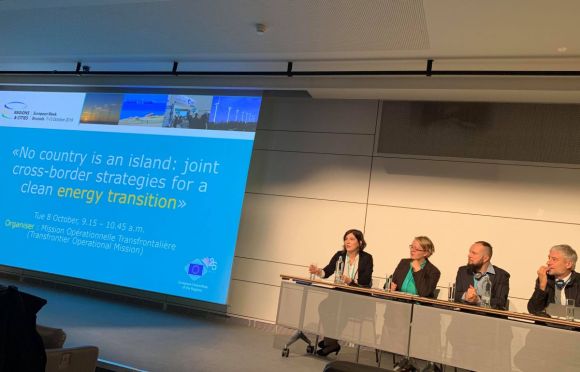
One of EU’s main goals is to break down borders and enhance territorial cohesion. However, the borders are still very much there and still constitute a great stumbling block for people who want to work with common challenges, such as clean energy transition in cross-border areas. During the session “No country is an island: Cross-border strategies for a clean energy transition” this issue became extra clear.
With rising concern about climate change and a growing demand for clean energy, cross-border corporations, some might say, are more important than ever. For example, connecting up energy networks in border regions can make it possible to meet the needs of the population for energy without investing in additional products.
However, public policies are still implemented within national frameworks that vary between countries which makes this kind of corporations difficult.
The problem is very much about different legislation, but also about different national visions and opinions about, for example how to deal with climate change. Jean Peyrony, director general of Mission Opérationelle Transfrontalière, MOT, said during the session “No country is an island: Cross-border strategies for a clean energy transition.''
Different work legislation one of the issues
On the picture: Leyre Azcona, Project manager, Euroregion Nouvelle-Aquitaine-Euskadi-Navarra, Spain
One example mentioned during the session was the marine renewable energy sector in the Euroregion Nouvelle-Aquitaine-Euskadi-Navarra. It aims to create an Euroregional offer with respect to the renewable marine energies, and to position the Euroregion as the international benchmark in this sector. Because of obstacles such as different work legislation, the cooperation and business opportunities are not developing to its full potential.
“We’re saying that we’re an European Union and we talk about mobility but still we have mental borders and obstacles at the borders. For us it is essential that we overcome this.” project manager Leyre Azcona said.
World's leader in the energy transition
The question of cross border strategy for a clean energy transition is important not only out of a climate point of view, but also because the European union has put in place a framework of policies and tools in order to position itself as the world's leader in the energy transition. It has set itself ambitious goals with the aim of creating an energy union that provides security of supply, increases the share of renewable energy and improves energy efficiency.
More energy policies at EU-level
On the picture: Peyrony, director general of Mission Opérationelle Transfrontalière, MOT.
So what needs to be done then? At the session Jean Peyriny requested coordinated regulations in cross-border territories and, more specifically, more energy policies at EU-level:
“The commission is already very aware about topics such as missing links in the field of transport but I think that the Commission now also needs to have this crossborder-context in mind when it goes for energy. We need to create interoperability between the national systems at a time where the national systems are still very, very present.” he said.
Project manager Leyre Azcona added: “We need to have everything alined - local, regional, national and European strategies. If not, you might have one country on one side working to counter climate change while the country on the other side isn't.“
European cross border mechanism
Ricardo Ferreira from the Cross-Border Cooperation Unit, who also participated at the session, admitted that more things need to be done to overcome obstacles surrounding cross-border corporation. Some solutions, he underlined, are already in the making. As an example, he mentioned the European Cross-Border Mechanism (ECBM) that aims to resolve legal and administrative obstacles in a cross-border context.
“It will never be enough, border obstacles are also language, culture, rivers and mountains. But we are trying our best to work on what we can.” he said.
 On the picture: Ricardo Ferreira from the Cross-Border Cooperation Unit
On the picture: Ricardo Ferreira from the Cross-Border Cooperation Unit
Written by: Hedda Berglund (Sweden)
Edited by: Iskra Tsankova (Bulgaria)



